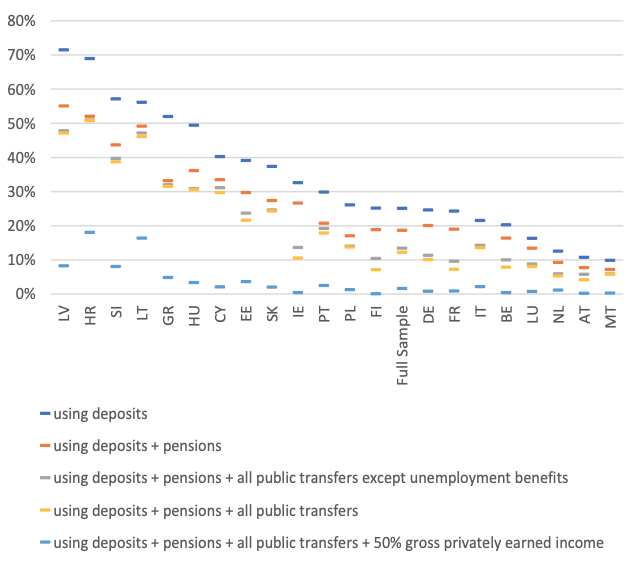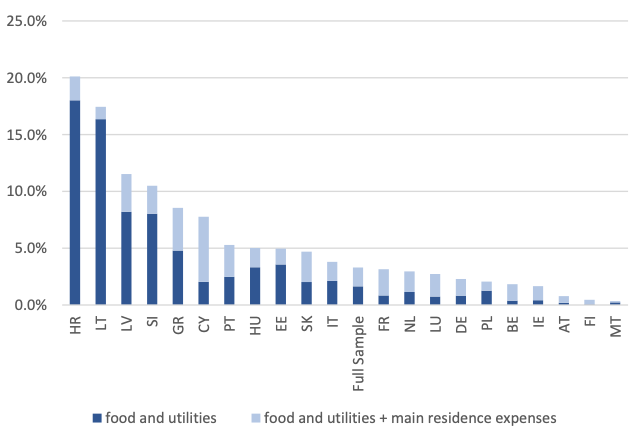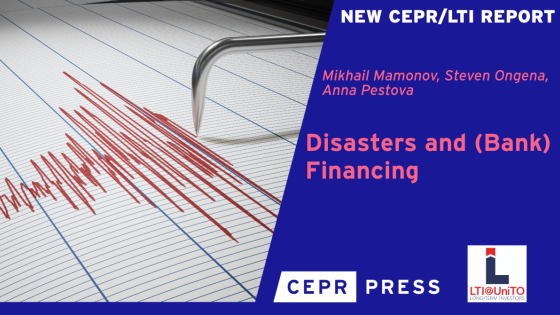The COVID-19 lockdown and ensuing crisis have forced many individuals to stop working or to substantially reduce their working hours. Many households are witnessing substantial decreases in their earnings that may last over time. In the UK and US, most people surveyed saw their income reduced, with the self-employed particularly affected (more than 70% experienced a decrease). Moreover, individuals expect such reductions will be sustained for the near future (Adams-Prassi et al. 2020).
Even as strict containment policies are loosened, the economic consequences of COVID-19 will endure and be exacerbated in the absence of a bold, continuous macroeconomic stimulus (Cerra et al. 2020).
An array of policies has been enacted throughout the EU in an attempt to ‘get ahead of the curve’ and minimise negative economic effects (Baldwin and di Mauro 2020). How useful are these policies to protect the most vulnerable?
To answer the question, in a new paper (Midões 2020), we simulate two scenarios based on the ECB Household Finance and Consumption Survey: living without privately earned income and living with 50% of gross privately earned income.1 The latter can be interpreted as living with a COVID-19 government support scheme, which, constructed in proportion to gross income, is more generous than it may at first seem. In France and Belgium schemes cover 70% of gross salaries and in Portugal 66%, on which individuals pay social security contributions and income tax (Anderson et al. 2020).
Under these scenarios, we determine whether households can afford one and two months of their most basic expenses – food and utilities – through bank savings, pension income, and public transfers.2 We then expand the analysis to consider housing expenses on main residences. The numbers reported are estimates of the number of individuals living in households unable to face expenses.3
Different buffers across Europe
The importance of privately earned income even in the short two-month horizon that we considered is clear: in the countries analysed, we estimate 41.6 million, or 12.2% of individuals, cannot cover for food and utilities without private earnings. In the first month, 8.7% of individuals are already dependent on their monthly income.
By taking home 50% of their gross privately earned income, the number of vulnerable individuals decreases substantially to 4.4 million unable to afford one month and 5.5 million (1.6%) unable to afford two months of food and utilities.
Differences across countries are substantial. In Croatia, Latvia, Lithuania, and Slovenia, more than 8% of individuals are unable to meet expenses with 50% of their gross income for two months, while in Austria, Belgium, Finland, and Malta, fewer than 0.5% of individuals are in such vulnerable positions.
When looking purely at deposits, 25% of individuals in the countries considered cannot cover two months of food and utilities – and 17.4% not even for one. In Latvia, 71% cannot pay for two months with their bank deposits, while in Austria and the Netherlands, the percentage is 11% and 12.5%, respectively.
Figure 1 Percentage of individuals who cannot cover two months of food and utilities, resorting to deposits and different sources of income
Note: Only individuals living in households with bank accounts were considered. See Midões (2020) for methodological details.
Pensions are a fundamental source of income in all countries, ensuring the livelihood of many households in the absence of other income. Public transfers other than pensions are crucial in France, Finland, Germany, and Ireland. In Greece, Italy, and Portugal, they do not provide substantial added social protection beyond pensions.
Governments are thus already providing buffers for many families in the absence of privately earned income. The automatic extension of unemployment benefits can be particularly effective in Belgium, Finland, and France, where they serve as an important buffer for recipients.
The large burden of housing expenses
We consider the burden of rents and mortgages on the main residence for individuals without other residential properties. After two months without privately earned income, 57.5 million individuals would not be able to pay for food, utilities, and housing expenses; 41.1 million individuals are already in this situation after one month without income.
If 50% of the gross privately earned income is guaranteed, the numbers decrease considerably: 8.4 million people cannot meet one month of basic expenses; 11.3 million for a period of two months.
Both rent and mortgage expenses substantially increase the number of vulnerable individuals, but tenants are more vulnerable than mortgage holders. When we considered only utilities and food, we found that 5.5 million individuals could not afford two months of expenses with 50% of their privately earned income. Once we add rents on main residences, the number of vulnerable individuals reaches 9.8 million. These 4.3 million individuals aided by rent suspension are substantially greater in number than the 220,000 landlords unable to cover their expenses for two months without rental income and with a 50% reduction of their remaining sources of income.
Figure 2 Percentage of individuals who cannot cover for two months of food and utilities with and without main residence expenses (rent or mortgage)
Note: Based on bank deposits, pensions, public transfers, and 50% of their gross privately earned income. Only individuals living in households with bank accounts were considered. See Midões (2020) for methodological details.
The corollary is that rent and mortgage suspension can be effective policies to protect the most vulnerable. While only 0.8% of the French population cannot afford two months of food and utilities, the number quadruples to 3.1% if rents and mortgages are included in the definition of ‘basic expenses’. In Finland, the percentage of vulnerable individuals jumps from 0.1% to 0.5%, and in Belgium, from 0.4% to 1.8%. Such measures would also be highly beneficial in Cyprus, Germany, and Ireland.
Immigrants are especially vulnerable
Individuals born outside of their country of residence and particularly outside of Europe are more at risk of not being able to cover for their food, utilities, and housing expenses.
For individuals living in their country of birth, the probability of not being able to cover such expenses for two months without any privately earned income is 16.3%, while for those born elsewhere in the EU and outside of Europe, it is 24.7% and 29.6%, respectively. That is, individuals born elsewhere in the EU are 1.5 times more at risk, while individuals born outside the EU 1.8 times more at risk.
The difference is accentuated in some countries: in Austria, those born outside of the EU are 3.4 times more at risk; in Belgium, 3.1, and Germany, 2.3 times.
Targeted policies are fundamental
In this column, we looked at whether individuals can keep their previous level of food, utilities, and housing expenses under different incomes shocks. Resorting to deposits alone, 25% of individuals considered cannot afford food and utilities for two months. Once housing expenses are included, the figure increases to 30%. Gambacorta et al. (2020) likewise conclude large shares of the population across Europe, without income, may not be able to maintain a minimum threshold of wellbeing (represented by the national at-risk-of-poverty threshold, 60% of the national median income).
Employment protection schemes around the EU are essential since even in a two-month horizon, savings and pre-existing public transfers do not provide enough cover for 57.5 million individuals. By taking home 50% of gross privately earned income, 11.3 million individuals would still not be able to cover two months of food and utilities and housing expenses.
Schemes must provide the minimum to keep households afloat. Ensuring the quick channelling of support to families is fundamental since financial difficulties are apparent already in the first month.
Of those still vulnerable when ensured 50% of gross privately earned income, we estimate 40% do not make employee income, relying instead on self-employment. COVID-19 policies in the EU for these groups, consisting mostly of allowances, are less generous than employment protection schemes (Anderson et al. 2020).
Individuals in informal work may be excluded from any COVID-19 government support. Immigrant groups, particularly those born outside of the EU, are more vulnerable to income shocks, aggravating difficulties in accessing support. Without targeted policies, these pockets of vulnerability will remain.
References
Adams-Prassi, A, T Boneva, M Golin and C Rauh (2020), “The large and unequal impact of COVID-19 on workers”, VoxEU.org, 8 April.
Anderson, J, E Bergamini, S Brekelmans, A Cameron, Z Darvas, M Domínguez Jíménez and C Midões (2020), “The fiscal response to the economic fallout from the coronavirus”, Bruegel Datasets, last update 6 May.
Baldwin, R, and B Weder di Mauro (eds.) (2020), Mitigating the COVID economic crisis: Act fast and do whatever it takes, VoxEU.org eBook, CEPR.
Cerra, V, A Fatás and S C Saxena (2020), “The persistence of a COVID-induce global recession”, VoxEU.org, 14 May.
Gambacorta, R, A Rosolia and F Zanichelli (2020), “All in it together, but with differences: The finances of European households through the pandemic”, VoxEU.org, 15 April.
Midões, C (2020), “Who can live without two months of income?”, COVID Economics, Vetted and Real-Time Papers 18, 15 May.
Endnotes
1 By privately earned income, we refer to income other than pensions and public transfers. It encompasses salary income, self-employed income, rental income, income from financial assets, and regular private transfers.
2 Utilities comprise electricity, water, gas, telephone, internet, and television. Only expenses with food at home are considered.
3 We cover the 21 EU countries analysed in the survey: Croatia, Hungary, Poland, and the Euro Area except for Spain, whose data will only be available later in the year.





